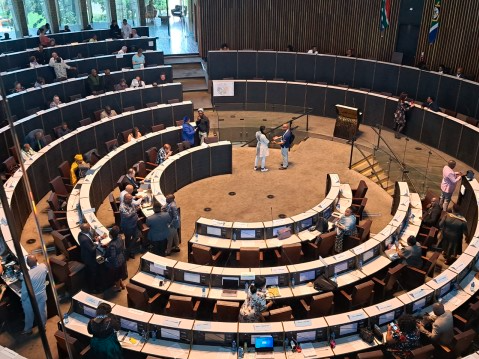Chaos in Johannesburg Council as adjustment budget fails to pass! The City of Johannesburg’s adjustment budget failed to pass this week after councillors clashed over its adoption, leading to a chaotic council meeting.
The city, governed by a coalition of the African National Congress (ANC), Economic Freedom Fighters (EFF), ActionSA, Patriotic Alliance (PA), and the Inkatha Freedom Party (IFP), has been struggling with massive service delivery challenges, including water shortages and growing public dissatisfaction.
Council Meeting Descends Into Chaos
The Democratic Alliance (DA) in Johannesburg accused the ANC of deliberately disrupting the meeting to prevent the budget from being voted on.
“The Johannesburg council meeting descended into chaos (on Thursday), and the speaker (Nobuhle Mthembu) was forced to adjourn proceedings due to the disruptive behaviour of ANC councillors during the adjustment budget vote,” the DA stated.
According to the DA, ANC councillors resorted to shouting and heckling to derail the vote because they knew the budget would not have passed.
DA Rejects the Budget Proposal
The DA firmly opposed the adjustment budget, describing it as a mismanagement of city finances by the ANC-led coalition.
“This budget is built on deception, with inflated revenue projections, reckless cuts to critical infrastructure – especially water infrastructure spending – and an unsustainable borrowing plan that will sink the city further into debt,” said DA Joburg caucus leader Belinda Kayser-Echeozonjoku.
She added that during the ongoing water crisis, Johannesburg Mayor Dada Morero and his executive attempted to push a budget that reduced spending on water infrastructure.
“The DA will not be intimidated, nor will we support this budget without serious changes,” Kayser-Echeozonjoku added.
A Struggling Municipality With Mounting Challenges
Johannesburg is one of South Africa’s largest and most economically significant cities, but it has been plagued by infrastructure failures, corruption scandals, and financial mismanagement.
The city has a total budget of nearly R76 billion, but the administration sought adjustments to fund new priorities amid months of service delivery failures, particularly persistent water shortages.
According to the GOOD Party, the city’s proposed budget cuts would have had a devastating impact on crucial projects, particularly housing and infrastructure development.
Some of the major budget reductions include:
- R165 million cut from informal settlement formalisation projects
- R5 million slashed from multiple hostel redevelopment projects
- R35.5 million removed from bulk infrastructure projects, including the Eikenhof substation
- R6.5 million cut from the Soweto planned water main replacement project
- R6.6 million cut from Orange Farm sewer mains projects
- R76 million slashed from the Halfway House water upgrade project
The GOOD Party warned that these reductions would have a negative impact on service delivery, especially given Johannesburg’s long history of infrastructure failures.
Concerns Over Water Infrastructure Spending Cuts
One of the most controversial aspects of the adjustment budget is the reduction in water infrastructure funding, despite Johannesburg experiencing worsening water shortages.
Communities across the city have been protesting over unreliable water supply, with some areas experiencing weeks without access to clean water.
Critics argue that cutting funding for water infrastructure while residents struggle with supply shortages shows a lack of accountability from city officials.
Opposition Parties Demand Accountability
Opposition parties, including the DA and the GOOD Party, insist that the ANC-led coalition must be held accountable for the city’s ongoing failures.
They argue that the budget, in its current form, prioritizes short-term political gains over long-term sustainability.
“Given the city’s history of water shortages and infrastructure failures, these reductions could negatively impact service delivery,” the GOOD Party warned.
What Happens Next?
The adjustment budget will have to be revisited, and negotiations between political parties will likely resume in the coming weeks.
With council deeply divided, it remains to be seen whether Johannesburg’s leadership can reach a compromise that ensures better service delivery while maintaining financial stability.
For now, residents continue to bear the brunt of the city’s mismanagement, with water shortages, failing infrastructure, and political infighting delaying much-needed progress.

